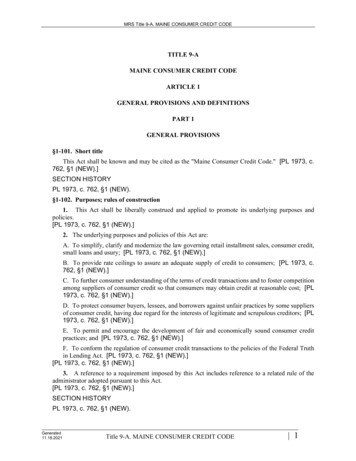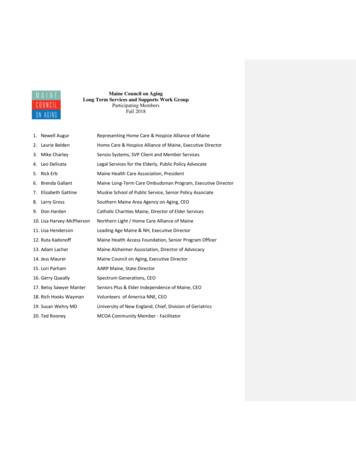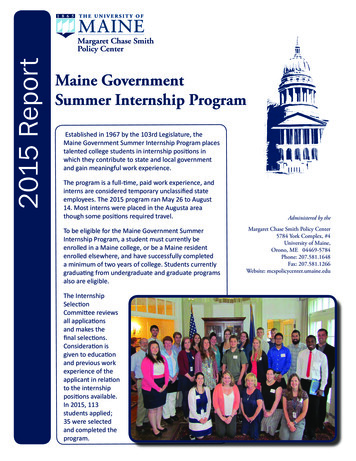
Transcription
MRS Title 9-A. MAINE CONSUMER CREDIT CODETITLE 9-AMAINE CONSUMER CREDIT CODEARTICLE 1GENERAL PROVISIONS AND DEFINITIONSPART 1GENERAL PROVISIONS§1-101. Short titleThis Act shall be known and may be cited as the "Maine Consumer Credit Code." [PL 1973, c.762, §1 (NEW).]SECTION HISTORYPL 1973, c. 762, §1 (NEW).§1-102. Purposes; rules of construction1. This Act shall be liberally construed and applied to promote its underlying purposes andpolicies.[PL 1973, c. 762, §1 (NEW).]2. The underlying purposes and policies of this Act are:A. To simplify, clarify and modernize the law governing retail installment sales, consumer credit,small loans and usury; [PL 1973, c. 762, §1 (NEW).]B. To provide rate ceilings to assure an adequate supply of credit to consumers; [PL 1973, c.762, §1 (NEW).]C. To further consumer understanding of the terms of credit transactions and to foster competitionamong suppliers of consumer credit so that consumers may obtain credit at reasonable cost; [PL1973, c. 762, §1 (NEW).]D. To protect consumer buyers, lessees, and borrowers against unfair practices by some suppliersof consumer credit, having due regard for the interests of legitimate and scrupulous creditors; [PL1973, c. 762, §1 (NEW).]E. To permit and encourage the development of fair and economically sound consumer creditpractices; and [PL 1973, c. 762, §1 (NEW).]F. To conform the regulation of consumer credit transactions to the policies of the Federal Truthin Lending Act. [PL 1973, c. 762, §1 (NEW).][PL 1973, c. 762, §1 (NEW).]3. A reference to a requirement imposed by this Act includes reference to a related rule of theadministrator adopted pursuant to this Act.[PL 1973, c. 762, §1 (NEW).]SECTION HISTORYPL 1973, c. 762, §1 (NEW).Generated11.18.2021Title 9-A. MAINE CONSUMER CREDIT CODE 1
MRS Title 9-A. MAINE CONSUMER CREDIT CODE§1-103. Supplementary general principles of law applicableUnless displaced by the particular provisions of this Act, the Uniform Commercial Code and theprinciples of law and equity, including the law relative to capacity to contract, principal and agent,estoppel, fraud, misrepresentation, duress, coercion, mistake, bankruptcy or other validating orinvalidating cause supplement its provisions. [PL 1973, c. 762, §1 (NEW).]SECTION HISTORYPL 1973, c. 762, §1 (NEW).§1-104. Construction against implicit repealThis Act being a general act intended as a unified coverage of its subject matter, no part of it shallbe deemed to be impliedly repealed by subsequent legislation if such construction can reasonably beavoided. [PL 1973, c. 762, §1 (NEW).]SECTION HISTORYPL 1973, c. 762, §1 (NEW).§1-105. SeverabilityIf any provision of this Act or the application thereof to any person or circumstances is held invalid,the invalidity does not affect other provisions or applications of this Act which can be given effectwithout the invalid provision or application, and to this end the provisions of this Act are severable.[PL 1973, c. 762, §1 (NEW).]SECTION HISTORYPL 1973, c. 762, §1 (NEW).§1-106. Adjustment of dollar amounts(REPEALED)SECTION HISTORYPL 1973, c. 762, §1 (NEW). PL 1975, c. 623, §6 (AMD). PL 1985, c. 121 (AMD). PL 1985, c.763, §§A15-17 (AMD). PL 1985, c. 819, §A9 (AMD). PL 1997, c. 727, §B1 (RP).§1-107. Waiver; agreement to forego rights; settlement of claims1. Except as otherwise provided in this Act, a consumer may not waive or agree to forego rightsor benefits under this Act. Any such waiver or agreement is unenforceable; and no creditor may takeany such waiver or agreement to forego rights or benefits under this Act.[PL 1973, c. 762, §1 (NEW).]2. A claim by a consumer against a creditor for an excess charge, other violation of this Act, orcivil penalty, or a claim against a consumer for default or breach of a duty imposed by this Act, ifdisputed in good faith, may be settled by agreement.[PL 1973, c. 762, §1 (NEW).]3. A claim, whether or not disputed, against a consumer may be settled for less value than theamount claimed.[PL 1973, c. 762, §1 (NEW).]4. A settlement in which the consumer waives or agrees to forego rights or benefits under this Actis invalid if the court, as a matter of law, finds the settlement to have been unconscionable at the timeit was made. The competence of the consumer, any deception or coercion practiced upon him, thenature and extent of the legal advice received by him and the value of the consideration are relevant tothe issue of unconscionability. Any claim of unconscionability must be raised in a judicial action withinthe earlier of:2 Title 9-A. MAINE CONSUMER CREDIT CODEGenerated11.18.2021
MRS Title 9-A. MAINE CONSUMER CREDIT CODEA. Six years after the date of settlement; or [PL 1987, c. 129, §1 (NEW).]B. The limitation period applicable to the original claim which was the subject of the settlement.[PL 1987, c. 129, §1 (NEW).][PL 1987, c. 129, §1 (AMD).]SECTION HISTORYPL 1973, c. 762, §1 (NEW). PL 1987, c. 129, §1 (AMD).§1-108. Effect of Act on powers of organizations1. This Act prescribes maximum charges for all creditors, except lessors and those excluded,section 1‑202, extending consumer credit including consumer credit sales, subsection 11 of section1‑301 and consumer loans subsection 14 of section 1‑301, and displaces existing limitations on thepowers of those creditors based on maximum charges.[PL 1973, c. 762, §1 (NEW).]2. With respect to sellers of goods or services, small loan companies, licensed lenders, consumerand sales finance companies, industrial banks and loan companies, and commercial banks and trustcompanies, this Act displaces existing limitations on their powers based solely on amount or durationof credit.[PL 1973, c. 762, §1 (NEW).]3. Except as provided in subsection 1, this Act does not displace limitations on powers of creditunions, savings banks, savings and loan associations, or other thrift institutions whether organized forthe profit of shareholders or as mutual organizations.[PL 1973, c. 762, §1 (NEW).]4. Except as provided in subsections 1 and 2, this Act does not displace:A. Limitations on powers of supervised financial organizations, subsection 38‑A of section 1‑301,with respect to the amount of a loan to a single borrower, the ratio of a loan to the value of collateral,the duration of a loan secured by an interest in land, or other similar restrictions designed to protectdeposits; or [PL 1997, c. 66, §1 (AMD).]B. Limitations on powers an organization is authorized to exercise under the laws of this State orthe United States. [PL 1973, c. 762, §1 (NEW).][PL 1997, c. 66, §1 (AMD).]SECTION HISTORYPL 1973, c. 762, §1 (NEW). PL 1997, c. 66, §1 (AMD).§1-109. Transactions subject to Act by agreementThe parties to a sale, lease or loan, or modification thereof, which is not a consumer credittransaction, may agree in a writing signed by the parties that the transaction is subject to the provisionsof this Act applying to consumer credit transactions. If the parties so agree, the transaction is a consumercredit transaction for the purposes of this Act. [PL 1973, c. 762, §1 (NEW).]SECTION HISTORYPL 1973, c. 762, §1 (NEW).§1-110. Relationship to federal lawNotwithstanding the provisions of Section 501 of the United States Depository InstitutionsDeregulation and Monetary Control Act of 1980, Public Law 96-221, the Legislature declares that themaximum finance charges established in article II apply to: [PL 1995, c. 137, §1 (AMD).]Generated11.18.2021Title 9-A. MAINE CONSUMER CREDIT CODE 3
MRS Title 9-A. MAINE CONSUMER CREDIT CODE1. Consumer credit transactions involving manufactured housing as defined in section 1‑301,subsection 23‑A; and[PL 1995, c. 137, §2 (AMD).]2.[PL 1995, c. 137, §3 (RP).]3. First lien mortgages on real estate granted by a creditor subject to licensing by the administratoras set out in section 2‑301.[PL 1981, c. 218 (NEW).]The Legislature declares that the preemption provided by the United States Garn-St. GermainDepository Institutions Act of 1982, Public Law 97-320, Section 804, shall not apply. The Legislaturefurther declares that the applicable provisions of the Maine Consumer Credit Code relating toalternative mortgage instruments shall apply, including, but not limited to, sections 3-308 and 3-310.[PL 1983, c. 307, §1 (NEW).]SECTION HISTORYPL 1981, c. 218 (NEW). PL 1983, c. 307, §1 (AMD). PL 1983, c. 720, §1 (AMD). PL 1987, c.129, §2 (AMD). PL 1993, c. 134, §1 (AMD). PL 1995, c. 137, §§1-3 (AMD).§1-111. Record retentionEvery person subject to this Act shall maintain records of all consumer credit transactions inconformity with generally accepted accounting principles and practices or in a manner that will enablethe administrator to determine whether that person or his assignee is complying with the provisions ofthis Act. The records need not be kept in the place of business where the transaction was entered into,if the administrator is given free access to the records, wherever located. All records pertaining toconsumer credit transactions shall be retained for at least 2 years after making the final entry on theaccount involved, except that in the case of open-end credit, the 2 years shall be measured from thedate of each account entry. [PL 1987, c. 129, §3 (AMD).]SECTION HISTORYPL 1985, c. 336, §1 (NEW). PL 1987, c. 129, §3 (AMD).PART 2SCOPE AND JURISDICTION§1-201. Territorial application1. Except as otherwise provided in this section, this Act applies to consumer credit transactionsand open-end credit plans made or entered into in this State. For purposes of this Act, a consumer credittransaction or open-end credit plan is made or entered into in this State if the creditor, wherever located,enters into a consumer credit transaction or open-end credit plan with a consumer who is located in thisState.A.[PL 2021, c. 245, Pt. A, §1 (RP).]B.[PL 2021, c. 245, Pt. A, §1 (RP).]C. [PL 2021, c. 245, Pt. A, §1 (RP).][PL 2021, c. 245, Pt. A, §1 (AMD).]2.[PL 1987, c. 129, §5 (RP).]4 Title 9-A. MAINE CONSUMER CREDIT CODEGenerated11.18.2021
MRS Title 9-A. MAINE CONSUMER CREDIT CODE3. The Part on Limitations on Creditors' Remedies, Part 1, of the Article on Remedies andPenalties, Article 5, applies to actions, other proceedings and nonjudicial collection activity conductedin this State to enforce rights arising from consumer credit sales, consumer leases, or consumer loans,or extortionate extensions of credit, wherever made.[PL 1987, c. 129, §6 (AMD).]4. A consumer credit transaction made in another state to a person who is a resident of this Stateat the time of the transaction is valid and enforceable in this State to the extent that it is valid andenforceable under the laws of the state applicable to the transaction, but the following provisions applyas though the transaction occurred in this State:A. A creditor may not collect charges through actions or other proceedings in excess of thosepermitted by the Article on Finance Charges and Related Provisions (Article 2) and by the Articleon Insurance (Article 4); and [PL 1973, c. 762, §1 (NEW).]B. A creditor may not enforce rights against the consumer with respect to the provisions ofagreements which violate the provisions on Limitations on Agreements and Practices (Part 3) andLimitations on Consumer's Liability (Part 4) of the Article on Regulation of Agreements andPractices (Article 3). [PL 1973, c. 762, §1 (NEW).][PL 1973, c. 762, §1 (NEW).]5. Except as provided in subsection 3, a consumer credit transaction made in another state to aperson who was not a resident of this State when the sale, lease, loan, or modification was made is validand enforceable in this State according to its terms to the extent that it is valid and enforceable underthe laws of the state applicable to the transaction.[PL 1973, c. 762, §1 (NEW).]6. For the purposes of this Act, the residence of a consumer is the address given by him as hisresidence in any writing signed by him in connection with a credit transaction or open-end credit plan.Until he notifies the creditor of a new or different address in a writing for that purpose, the given addressis presumed to be unchanged.[PL 1987, c. 129, §7 (AMD).]7. Notwithstanding other provisions of this section:A. Except as provided in subsection 3, this Act does not apply if the consumer is not a resident ofthis State at the time of a credit transaction and the parties have agreed that the law of his residenceapplies; and [PL 1973, c. 762, §1 (NEW).]B. This Act applies if the consumer is a resident of this State at the time of a credit transaction andthe parties have agreed that the law of his residence applies. [PL 1973, c. 762, §1 (NEW).][PL 1973, c. 762, §1 (NEW).]8. Except as provided in subsection 7, the following agreements by a buyer, lessee, or debtor areinvalid with respect to consumer credit transactions to which this Act applies:A. That the law of another state shall apply; [PL 1973, c. 762, §1 (NEW).]B. That the consumer consents to the jurisdiction of another state; and [PL 1973, c. 762, §1(NEW).]C. That fixes venue. [PL 1973, c. 762, §1 (NEW).][PL 1973, c. 762, §1 (NEW).]9. The following provisions of this Act specify the applicable law governing certain cases:A. Applicability, section 6‑102, of the Part on Powers and Functions of Administrator, Part 1, ofthe Article on Administration, Article 6; and [PL 1973, c. 762, §1 (NEW).]Generated11.18.2021Title 9-A. MAINE CONSUMER CREDIT CODE 5
MRS Title 9-A. MAINE CONSUMER CREDIT CODEB. Applicability, section 6‑201, of the Part on Notification and Fees, Part 2, of the Article onAdministration, Article 6. [PL 1973, c. 762, §1 (NEW).][PL 1973, c. 762, §1 (NEW).]10. Notwithstanding any other provision of law, this Act applies to any person offering, arrangingor purporting to offer or arrange a consumer credit transaction if that person, in advertising or solicitingor otherwise communicating with a consumer, asserts to be located in this State or to possess a licenseor registration issued pursuant to this Act.[PL 2005, c. 206, §1 (NEW).]SECTION HISTORYPL 1973, c. 762, §1 (NEW). PL 1975, c. 658 (AMD). PL 1987, c. 129, §§4-7 (AMD). PL 2001,c. 371, §1 (AMD). PL 2005, c. 206, §1 (AMD). PL 2005, c. 604, §1 (AMD). PL 2021, c. 245,Pt. A, §1 (AMD).§1-202. ExclusionsThis Act does not apply to: [PL 1973, c. 762, §1 (NEW).]1. Extensions of credit primarily for business, commercial or agricultural purposes or fromgovernments or governmental agencies, instrumentalities or organizations;[PL 1987, c. 396, §1 (AMD).]1-A. Transactions for which the administrator, by rule, determines that coverage under this Titleis not necessary to carry out the purposes of this Title;[PL 1997, c. 155, Pt. C, §1 (NEW).]2. Except as otherwise provided in the Article on Insurance (Article 4), the sale of insurance byan insurer if the insured is not obliged to pay instalments of the premium and the insurance mayterminate or be cancelled after nonpayment of an instalment of the premiums;[PL 1973, c. 762, §1 (NEW).]3. An extension of credit that involves public utility services provided through pipe, wire, otherconnected facilities, radio or similar transmission, including extensions of these facilities, if the chargesfor service, delayed payments or any discounts for prompt payment are filed with or regulated by anysubdivision or agency of this State or of the United States. This exemption does not apply to financingof goods or home improvements by a public utility;[PL 1987, c. 129, §9 (RPR).]4. Ceilings on rates and charges or limits on loan maturities of a credit union organized under thelaws of this State or of the United States if these ceilings or limits are established by these laws;[PL 1979, c. 127, §51 (AMD).]5. Ceilings on rates and charges of a licensed pawnbroker if these ceilings are established bystatute;[PL 1973, c. 762, §1 (NEW).]6. Transactions in securities or commodities accounts with a broker-dealer registered with eitherthe Securities and Exchange Commission or the Commodities Futures Trading Commission;[PL 1979, c. 127, §52 (AMD).]7. Except as provided by Article 14, a loan or consumer credit sale made exclusively for thepurpose of deferring or financing educational expenses and on which the finance charge does not exceedthat rate per year on the unpaid balances of the amount financed, as established by federal law, or, forloans or consumer credit sales for which federal law does not establish a rate, the highest rateestablished for educational loans under any federal program and which is insured, guaranteed,subsidized or made directly by the Federal Government, a state, a nonprofit private loan guaranty or6 Title 9-A. MAINE CONSUMER CREDIT CODEGenerated11.18.2021
MRS Title 9-A. MAINE CONSUMER CREDIT CODEorganization, by the educational institution itself or through an endowment or trust fund affiliated withsuch an institution;[PL 2019, c. 431, §1 (AMD); PL 2019, c. 431, §4 (AFF).]8. A loan or credit sale made by a creditor to finance or refinance the acquisition of real estate orthe initial construction of a dwelling, or a loan made by a creditor secured by a first mortgage on realestate, if the security interest in real estate is not made for the purpose of circumventing or evading thisAct, provided that:A. With respect to advances of additional funds on the loan or credit sale made more than 30 daysafter the initial advance, this exclusion applies only to advances made:(1) Pursuant to the terms of a construction financing agreement;(2) To protect the security or to perform the covenants of the consumer;(3) As negative amortization of principal under the terms of the financing agreement;(4) From funds withheld at consummation pending the resolution of matters that otherwisewould tend to delay or prevent closing, including, without limitation, remedy of title defects orrepairs to meet appraisal standards; or(5) Pursuant to the terms of a reverse mortgage transaction, as defined in the Federal Truth inLending Act, 15 United States Code, Section 1601 et seq., if the transaction is made pursuantto a commitment to purchase issued by, or is in a form approved for purchase by, any state orfederal agency, instrumentality or government-sponsored enterprise, including, withoutlimitation, the Federal National Mortgage Association or the Federal Home Loan MortgageCorporation; [PL 2011, c. 427, Pt. D, §1 (AMD).]B. The exemption provided by this subsection does not apply to the requirements on servicing ofassigned supervised loans, section 2‑310; and [PL 1987, c. 129, §11 (NEW).]C. With respect to a creditor other than a supervised financial organization, the exemption providedby this subsection applies to Articles 2, 3, 4 and 5 only; or [PL 2005, c. 55, §2 (AMD).][PL 2011, c. 427, Pt. D, §1 (AMD).]8-A.[PL 1987, c. 129, §12 (RP).]9.[PL 1979, c. 541, §87 (RP).]10. A no-interest loan or credit sale by a nonprofit organization that assists in building orrenovating housing for those in need. The exclusion in this subsection does not apply to Article 6, Part1; section 6‑201; section 6‑202; section 6‑203, subsection 1; section 6-204; or Article 8-A.[PL 2011, c. 427, Pt. D, §2 (AMD).]The exclusions set forth in subsection 1 relating to extensions of credit to consumers bygovernments or governmental agencies, instrumentalities or organizations, and in subsections 2, 4, 5, 7and 8, do not apply to the Maine Consumer Credit Code, Truth-in-lending, Article 8‑A. [PL 2011, c.427, Pt. D, §3 (AMD).]SECTION HISTORYPL 1973, c. 762, §1 (NEW). PL 1975, c. 318 (AMD). PL 1975, c. 413 (AMD). PL 1975, c. 446,§3 (AMD). PL 1977, c. 696, §112 (AMD). PL 1979, c. 127, §§51-56 (AMD). PL 1979, c. 541,§§A85-A88 (AMD). PL 1979, c. 660, §§1-3 (AMD). PL 1981, c. 243, §§1,2,26 (AMD). PL 1981,c. 551, §3 (AMD). PL 1981, c. 618, §1 (AMD). PL 1981, c. 638, §1 (AMD). PL 1983, c. 212,§§1,2 (AMD). PL 1983, c. 641, §1 (AMD). PL 1983, c. 720, §2 (AMD). PL 1985, c. 336, §2(AMD). PL 1987, c. 129, §§8-12 (AMD). PL 1987, c. 396, §§1-3 (AMD). PL 1997, c. 64, §1Generated11.18.2021Title 9-A. MAINE CONSUMER CREDIT CODE 7
MRS Title 9-A. MAINE CONSUMER CREDIT CODE(AMD). PL 1997, c. 155, §C1 (AMD). PL 2005, c. 55, §§1-3 (AMD). PL 2007, c. 273, Pt. C, §1(AMD). PL 2007, c. 471, §1 (AMD). PL 2007, c. 471, §18 (AFF). PL 2011, c. 427, Pt. D, §§13 (AMD). PL 2019, c. 431, §1 (AMD). PL 2019, c. 431, §4 (AFF).§1-203. Jurisdiction and service of process1. The Superior and District Courts of this State may exercise jurisdiction over any creditor withrespect to any conduct in this State governed by this Act or with respect to any claim arising from atransaction subject to this Act. In addition to any other method provided by rule or by statute, personaljurisdiction over a creditor may be acquired in a civil action or proceeding instituted in the Superiorand District Courts by the service of process in the manner provided by this section.[PL 1973, c. 762, §1 (NEW).]2. If a creditor is not a resident of this State or is a corporation not authorized to do business inthis State and engages in any conduct in this State governed by this Act, or engages in a transactionsubject to this Act, he may designate an agent upon whom service of process may be made in this State.The agent shall be a resident of this State or a corporation authorized to do business in this State. Thedesignation shall be in writing and filed with the Secretary of State. If no designation is made and filedor if process cannot be served in this State upon the designated agent, process may be served upon theSecretary of State, but service upon him is not effective unless the plaintiff or petitioner forthwith mailsa copy of the process and pleading by registered or certified mail to the defendant or respondent at hislast reasonably ascertainable address. An affidavit of compliance with this section shall be filed withthe clerk of the court on or before the return day of the process, if any, or within any further time thecourt allows.[PL 1973, c. 762, §1 (NEW).]SECTION HISTORYPL 1973, c. 762, §1 (NEW).PART 3DEFINITIONS§1-301. General definitionsIn addition to definitions appearing in subsequent Articles, in this Act: [PL 1973, c. 762, §1(NEW).]1. "Actuarial method" means the method, defined by rules adopted by the administrator, ofallocating payments made on debt between the amount financed and the finance charge pursuant towhich a payment is applied first to the accumulated finance charge and the balance is applied to theunpaid amount financed.[PL 1973, c. 762, §1 (NEW).]2. "Administrator" means, except in cases in which a supervised financial organization is thecreditor, the administrator designated in Article VI, section 6‑103. In cases in which a supervisedfinancial organization is the creditor, "administrator" means the Superintendent of FinancialInstitutions.[PL 2001, c. 44, §1 (AMD); PL 2001, c. 44, §14 (AFF).]2-A. "Advertisement" means a commercial message in any medium that promotes, directly orindirectly, a consumer credit transaction.[PL 1987, c. 129, §13 (NEW).]8 Title 9-A. MAINE CONSUMER CREDIT CODEGenerated11.18.2021
MRS Title 9-A. MAINE CONSUMER CREDIT CODE3. "Agreement" means the bargain of the parties in fact as found in their language or by implicationfrom other circumstances including course of dealing or usage of trade or course of performance.[PL 1973, c. 762, §1 (NEW).]4."Agricultural purpose" means a purpose related to the production, harvest, exhibition,marketing, transportation, processing, or manufacture of agricultural products by a natural person whocultivates, plants, propagates or nurtures the agricultural products. "Agricultural products" includesagricultural, horticultural, viticultural, and dairy products, livestock, wildlife, poultry, bees, forestproducts, fish and shellfish, and any products thereof, including processed and manufactured products,and any and all products raised or produced on farms and any processed or manufactured productsthereof.[PL 1973, c. 762, §1 (NEW).]5. "Amount financed" means the amount of credit of which the consumer has actual use and iscomputed pursuant to section 2‑501 and the Federal Truth in Lending Act, 15 United States Code,Section 1601 et seq.[PL 2011, c. 427, Pt. D, §4 (AMD).]5-A.[PL 1989, c. 70, §1 (RP).]6. "Billing cycle" or "cycle" means the interval between days or dates of regular periodicstatements. These intervals shall be equal and no longer than a quarter of a year. An interval shall beconsidered equal if the number of days in the cycle does not vary more than 4 days from the regularday or date of the periodic statement.[PL 1987, c. 129, §15 (RPR).]6-A. "Business day" means a day on which a creditor's offices are open to the public for carryingon substantially all of its business functions. For purposes of rescission, the term means all calendardays, except Sundays and the holidays established by Title 9‑B, section 145, subsection 1.[PL 1997, c. 398, Pt. L, §4 (AMD).]6-B. "Cardholder" means the same as defined in the Federal Truth in Lending Act, 15 UnitedStates Code, Section 1601 et seq.[PL 2011, c. 427, Pt. D, §5 (AMD).]6-C. "Card issuer" means the same as defined in the Federal Truth in Lending Act, 15 UnitedStates Code, Section 1601 et seq.[PL 2011, c. 427, Pt. D, §5 (AMD).]7. "Cash price" means the price at which the creditor, in the ordinary course of business, offers tosell for cash the property or service that is the subject of the transaction. The term includes chargesimposed by the creditor equally on cash and credit customers. It may include the price of optionalaccessories, services related to the sale, service contracts and taxes and fees for license, title andregistration. The term does not include any finance charge.[PL 1981, c. 243, §4 (RPR).]8. "Closing costs," provided they are bona fide, reasonable in amount and not for the purpose ofcircumvention or evasion of this Act, with respect to a debt or open-end credit plan secured by aninterest in land or a consumer credit transaction involving manufactured housing, include:A. Fees or premiums for title examination, abstract of title, title insurance or similar purposes andfor required related property surveys; [PL 1975, c. 324, §1 (RPR).]B. Fees for preparation of deeds, settlement statements or other documents; [PL 1975, c. 324,§1 (RPR).]Generated11.18.2021Title 9-A. MAINE CONSUMER CREDIT CODE 9
MRS Title 9-A. MAINE CONSUMER CREDIT CODEC. Amounts required to be placed or paid into an escrow or trustee account for future payments ifthe amounts would not otherwise be included in the finance charge; [PL 1987, c. 129, §17(AMD).]D. Fees for notarizing deeds and other documents; [PL 1975, c. 324, §1 (RPR).]E. Appraisal fees; and [PL 1975, c. 324, §1 (RPR).]F. Credit reports. [PL 1975, c. 324, §1 (RPR).][PL 1987, c. 129, §17 (AMD).]9. "Conspicuous." A term or clause is conspicuous when it is so written that a reasonable personagainst whom it is to operate ought to have noticed it. Whether a term or clause is conspicuous or notis for decision by the court.[PL 1973, c. 762, §1 (NEW).]10. "Consumer" means a cardholder or a natural person to whom consumer credit is offered orextended and includes a cosigner. The term includes a natural person who enters into a consumer lease.For purposes of rescission, the term includes a natural person in whose principal dwelling a securityinterest is or will be retained or acquired, if that person's ownership interest in the dwelling is or willbe subject to the security interest.[PL 1987, c. 129, §18 (RPR).]11. "Consumer credit sale":A. A "consumer credit sale" is a sale of goods, services or an interest in land in which:(1) Credit is granted either pursuant to a credit card other than a lender credit card or by a sellerwho regularly engages as a seller in credit transactions of the same kind;(2) The buyer is a person other than an organization;(3) The goods, services or interest in land are purchased primarily for a personal, family orhousehold purpose;(4) Either the debt is payable in installments or a finance charge is made;(5) With respect to a sale of goods or services, not including manufactured housing or a motorvehicle, the amount financed does not exceed 50,000, consistent with Title X of the federalDodd-Frank Wall Street Reform and Consumer Protection Act, Public Law 111-203; and(6) With respect to a sale of a motor vehicle as defined in Title 29‑A, section 101, subsection42, the amount financed does not exceed 50,000, consistent with Title X of the federal DoddFrank Wall Street Reform and Consumer Protection Act, Public Law 111-203.The amounts set out in subparagraphs (5) and (6) are automatically adjusted to correspond with anyinflation adjustment made to the exempt transaction amount referenced in the Federal Truth inLending Act, Section 104, subsection (3) and any rules adopted pursuant to that Act. [PL 2011,c. 427, Pt. A, §1 (AMD).]B.[PL 1987, c. 396, §5 (RP).]C. [PL 1985, c. 763, §18 (RP).][PL 2011, c. 427, Pt. A, §1 (AMD).]12. "Consumer credit transaction" means a consumer credit sale, consumer lease or consumer loanor a modification thereof including a refinancing, consolidation or deferral.[PL 1973, c. 762, §1 (NEW).]13. A "consumer lease" is a lease of goods:10 Title 9-A. MAINE CONSUMER CREDIT CODEGenerated11.18.2021
MRS Title 9-A. MAINE CONSUMER CREDIT CODEA. That a lessor regularly engaged in the business of leasing makes to a person, other than anorganization, who takes under the lease primarily for a personal, family or household purpose; [PL2011, c. 427, Pt. A, §2 (AMD).]B. In which the amount payable under the lease does not exceed 50,000, consistent with Title Xof the federal Dodd-Frank Wall Street Reform and Consumer Protection Act, Public Law 111-203.The exempt transaction amount in this paragraph is automatically adjusted to correspond with anyinflation adjustment made to the exempt transaction amount referenced in the Federal Truth inLending Act, Section 181, subsection (1) and any rules adopted pursuant to that Act; [PL 2011,c.
B. To provide rate ceilings to assure an adequate supply of credit to consumers; [PL 1973, c. 762, §1 (NEW).] C. To further consumer understanding of the terms of credit transactions and to foster competition among suppliers of consumer credit so that consumers may obtain credit at reasonable cost; [PL 1973, c. 762, §1 (NEW).] D.










